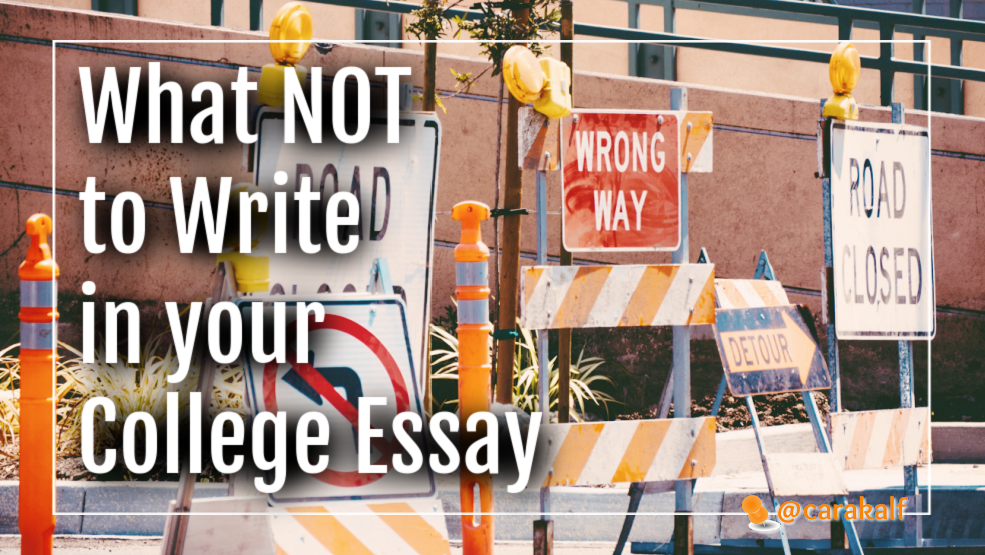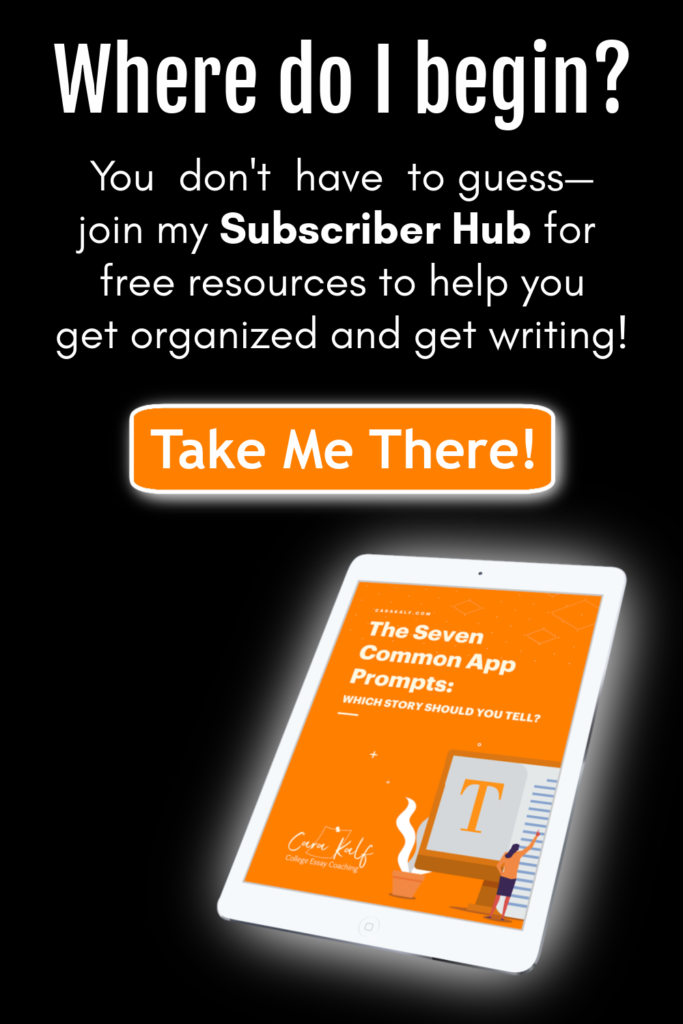What NOT to Write in Your College Essay
I never cease to be amazed by the extensive collection of topics the internet tells you NEVER to write about for your college essay: times you were happy, times you were sad, times you were successful, times you made a mistake, times you helped someone less fortunate, times you helped your team to victory. Honestly, if you manage to avoid every topic I’ve read you should avoid—I don’t know what you’re actually left with.
I have good news for you. The list of what not to write is a lot shorter than most people would have you believe.
It Ain’t What You Do (It’s How You Do It)
As the song says, when it comes to college essay topics, it’s not the what that gets the results—it’s the how. How you tell your story—the details you include, the tone you create, the feelings you evoke in your reader—is where you win or lose. This is my tenth year reading college essays, and I have read very few that felt redundant—despite that from a big-picture perspective, our lives are not all that different. I have read about similar medical events, similar personal losses, similar sports challenges, and similar mental-health struggles—and what mattered was not that the student had an experience that other students had had. What mattered was that in each essay, I could hear the student and who they were becoming.
So are there any topics you really should avoid? Well, not specific topics as much as ways of exploring them. Let me elaborate …
A Guided Tour
The number one thing to avoid in an essay is to attempt to cover so many parts of your life that it feels less like a coherent essay and more like a Guided tour of your life. That’s what the Activities List is for! You don’t have to worry that if you don’t mention something in your essay, it will be forgotten. Choose the aspect of yourself that is most important to highlight, and then choose the story that best highlights it—whether that’s yearbook, ballet, or caring for your sick grandparent.
Something That’s All Inside
I have written repeatedly on the importance of outside story and inside story—because it’s super-important and often overlooked. Writing about a challenge that you experienced inside—depression, anxiety, learning differences—can be difficult to do well. That doesn’t mean you shouldn’t write those topics if they feel crucial to understanding who you are. It simply means you need to think about the ways those inside struggles came out into the world. You need to tell the reader a story they can see. Even a student who is going through depression and getting out much less than they used to is still experiencing something in the world outside. Telling the story of what that outside life looked like helps the reader better understand the struggle of that inner life.
Something That’s All Outside
The flip side of a story that’s all in your head and heart is one that is all about what you experienced, without letting the reader get close enough to understand how you developed as a result. I have had many students write about their physical health in totally appropriate and interesting ways. If you have gone through a major health crisis that took significant time and effort to repair, delayed or destroyed long-held athletic dreams, or in general prevented you from living a normal life—that is a story of growth that is totally fair to write about. But you must let the reader inside to feel the impact. Many students have had life-threatening allergies or major sports injuries. Your story is still your story, and you deserve to tell it. But don’t summarize. The details of the experience, especially your thoughts and feelings, are what matters.
Something that’s All Confidence
Your story should show some growth—which means there has to be a “ before.” Some students are so used to projecting confidence all of the time, or so mindful of presenting their best self to schools, that their essay comes across too much like bragging. Even when they include a mention of a “before” when they were less confident or successful, they are writing in summary, from the perspective of their later self. It comes across as shallow and not terribly believable or meaningful. “I used to be nervous about speaking up in class, but sophomore year I decided I was going to improve my class participation grade no matter how scared I was. I began raising my hand in every class until my teachers had to stop calling on me!” Well, that’s … nice. But nothing about it suggests a true wrestling with why you were nervous in the first place, or what changed exactly that pushed you past your fear. It might have been a big deal to you, but unless you reveal more about why it was a big deal, the reader is going to be unimpressed.
A Mentor
I have said elsewhere that the only discrete topic I don’t recommend is writing about a mentor or role model. It’s entirely too much about something that is … not you. If a person plays a particular role in a particular story you want to tell, by all means, take a moment to explain why they were so important to you—but don’t let the essay be entirely about how you want to be like them.
Something That Ended A Long Time Ago
OK, here’s one more specific NO: A story that happened entirely in the past. That doesn’t mean, Don’t write about a story that happened to you years ago that made a huge impact on your life. It simply means, don’t stop the story until the reader meets the YOU who’s actually applying to college—the YOU you are now.
Something That Doesn’t Really Matter to You
“They” say not to write about anything too controversial. The question I always ask is, If this topic is fundamental to who you are, do you want to attend a university that believes this topic is controversial? If—for example-you, like me, believe that students should not have to fear a violent death in their classrooms, and you want to write about some kind of activism you did around that subject—go for it. (See, that’s me practicing what I preach and being direct about a topic that is important to me 😉 ) Understand I’m not saying this is completely without risk, only that if you end up being rejected from a school over it, it was likely a poorly fit school for you. The truth is, most schools like to see you take a stand around something that matters to you.
In the same way, “they” say not to write about anything “too” personal. Where is the line for “too” personal? I have had one student in ten years I had to gently push away from a topic I felt would be awkward for college readers. One. If you find you are often surprised when things you say make other people uncomfortable, you might run your topic or essay draft by a trusted friend or adult. In general, however, I find that most people have a very strong sense of what would be embarrassing or ‘overshare,’ so I wouldn’t get too paranoid over this vague guideline.
So What Do I Choose?
Almost any topic can sound dull or cliché in a one-line summary—that’s why business people work so hard on their “elevator speeches” to get someone interested in just a few lines. But you have no need to “sell” someone on your topic! The only place this is a problem for you is at the lunch table when your friends gather ‘round and give each other anxiety about how terrible their topic choices are. Don’t let your friends talk you out of a topic based on your one-line explanation.
The topic you use really does matter a lot —but less for whether it’s going to inherently bore your reader, and more if it bores you! If you aren’t interested in your topic, the writing process is going to be painful and the results mediocre.
If you’re stuck on your brainstorming, I have the tools you need! Developed over years of one-on-one coaching with students, my Essay Kick-Off workshop will lead you through the Common App prompts to find that Goldilocks topic—neither too personal nor too impersonal, neither too internal nor too external—just right. If you’re considering an Early Action or Early Decision submission, you need to start your essay now. Devote time this weekend to completing the workshop and you could have a rough draft by Monday!
(Photo by Jamie Street on Unsplash)


